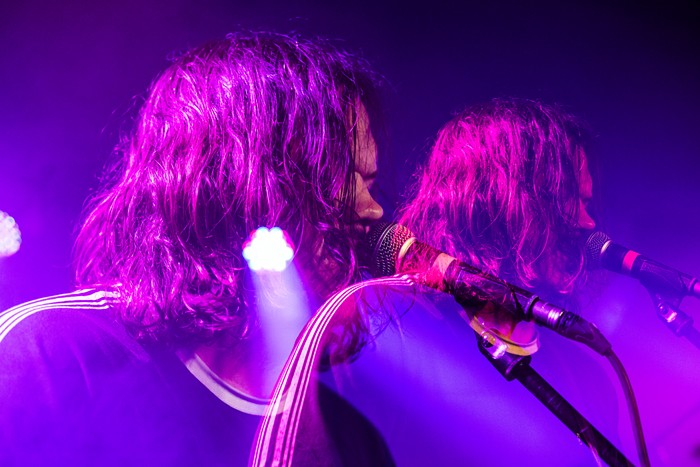
In addition to the 300-plus bands playing at Paul Allen’s ambitious Upstream Music Festival, there’s also the Upstream Summit—a two-day conference aimed at “digging into the most pressing opportunities and challenges currently facing the music industry.”
What does it look like when a tech billionaire designs and finances a conference meant to help DIY artists ‘monetize their brand’? Exactly the way you’d think. There’s overpriced coffee. There’s talk of the “new music economy”—where everybody is on a hunt for “authenticity” and band payoffs are in Instagram likes and viral videos. There’s reps from Amazon, there’s a startup showcase with new tools that promise to “disrupt” the status quo (“Bands aren’t the only ones in the music industry to start out in a garage!” reads the description). There’s a VR experience booth, and there are “breakout sessions” designed to help emerging musicians find their fan base, dive deep into analytics and data, and figure out the streaming game.
It's a game, as the legendary Quincy Jones pointed out in the keynote talk that kicked off the fest and summit yesterday morning, that musicians are losing right now, earning only $1 per every thousand plays for a song on Spotify. (Other estimates say it actually comes out to more like $4 for every thousand plays but it’s still a dismal amount, and who am I to fact check the “Q”?)
“To me, streaming services are basically taking my property and just giving it away to people, it seems,” says Jeffrey McNulty, a local Seattle musician attending the “How to Win in the Streaming Economy” breakout session. McNulty’s been in a range of bands since 1996, starting with death metal outfit BlöödHag and on to his current project of "dungeons and dragons nerdery," called Githyanki. McNulty's gone through just about every indie musician’s right of passage, from touring on and off for over a decade, to getting albums on Alternative Tentacles and other local labels, to now maintaining more than half a dozen Bandcamp accounts for all his bands.

“But you know, just from an indie perspective, I've never really seen a dime from any label I've ever been on, either,” he laughed.
Taryn Rene Dorsey, a speaker on the panel for the streaming session, is used to doing it all—and went from recording with her former punk band NighttraiN in a basement to now needing to find a producer to help her new band, Wiscon, sound more polished, pop sound.
“I would love to have all of our music on a record and somebody else to pay for it, and to do all the promotion, because it’s exhausting being your own PR person, producer, distro, marketing…every single piece of it.”

So, the point of the Upstream Summit is to tackle these problems by having music industry pros and techies help musicians demystify how to monetize their craft and actually make a living wage from their music ('cause it’s still all about the music…right?).
But as local hiphop artist Gabriel Teodras pointed out in one breakout session, isn’t it a little ironic that Allen is also fueling the gentrification that drives many struggling creatives in neighborhoods like the Central District to have to leave?
“It's ironic, but is it also not par for the course these days? It’s just like, 'Thanks Uncle Paul.' I mean, who is going to bankroll something like this, you know?” McNulty says.
Dorsey still thinks that Upstream can open doors for smaller bands are finding it hard to break into the festival cycle, which is often dominated by the same few acts through the course of a season.
“I have friends who are playing Upstream that normally wouldn't necessarily be noticed by one of the other festivals around here, like Bumbershoot or Block Party,” she says.
“Maybe this is the new sort of tech bro version of the Seattle music conference and we're just going to be able to use it for our own advantage, you know? I mean, I'm trying to look on the bright side,” adds McNulty.


















